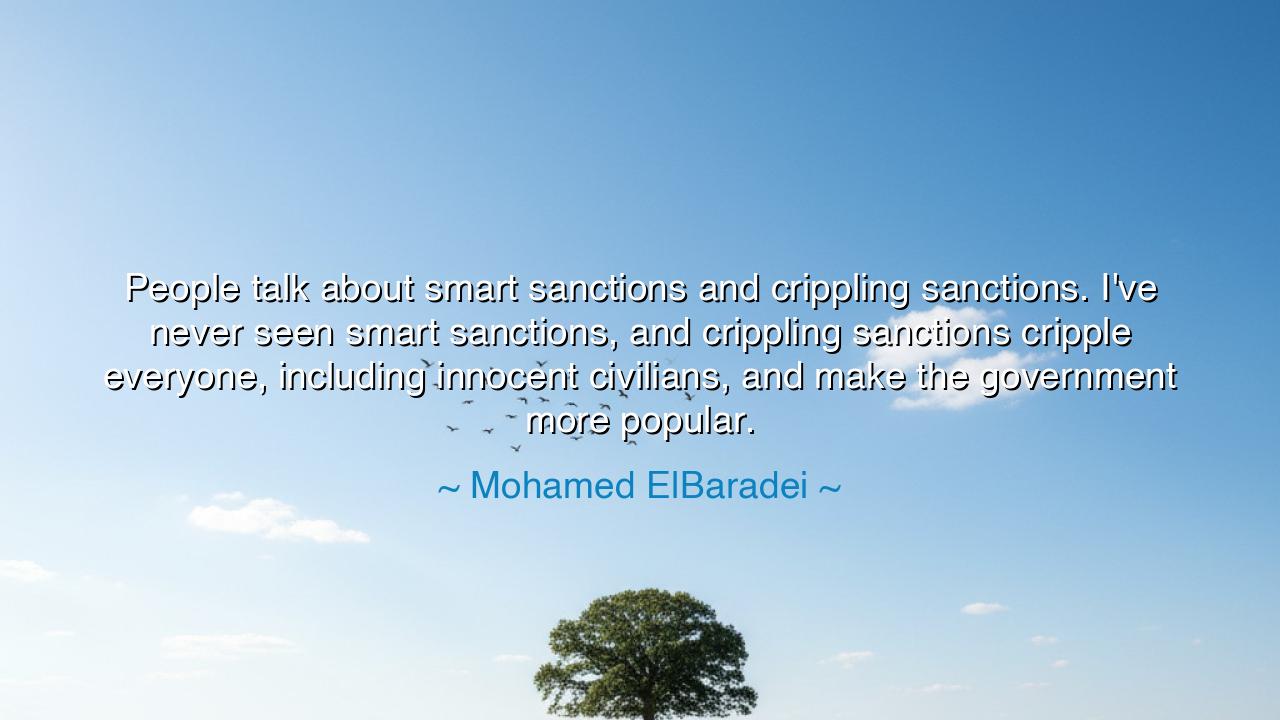
People talk about smart sanctions and crippling sanctions. I've
People talk about smart sanctions and crippling sanctions. I've never seen smart sanctions, and crippling sanctions cripple everyone, including innocent civilians, and make the government more popular.






“People talk about smart sanctions and crippling sanctions. I've never seen smart sanctions, and crippling sanctions cripple everyone, including innocent civilians, and make the government more popular.” Thus spoke Mohamed ElBaradei, a man of reason and conscience, who spent his life walking the narrow bridge between power and peace. His words, born of experience in the turbulent realm of international diplomacy, carry the sorrow of one who has seen noble intentions twisted into suffering. He warns us that the tools of punishment, however refined they appear, often wound not the guilty but the helpless — that sanctions, meant to restrain the strong, too often break the weak. In this truth lies both a moral lesson and a reflection of the deep paradoxes of human governance: that justice, when blinded by pride, can become cruelty disguised as virtue.
The origin of this quote arises from ElBaradei’s long years as head of the International Atomic Energy Agency (IAEA), where he sought to balance the fear of war with the pursuit of peace. He witnessed firsthand the world’s attempts to discipline nations through economic sanctions — measures proclaimed as peaceful alternatives to war, yet carrying the quiet devastation of war’s shadow. He spoke these words in response to the suffering he observed in countries burdened by international embargoes, where ordinary people — children, farmers, mothers — bore the cost of decisions made in distant chambers of power. To him, the phrase “smart sanctions” was a cruel illusion, a term crafted to soothe the conscience of those who imposed suffering while claiming moral high ground.
When ElBaradei says he has “never seen smart sanctions,” he unmasks the hollowness of the phrase. For what is “smart” about depriving a hospital of medicine, or a city of clean water, because its rulers defied another’s will? Sanctions, he argues, may be aimed at governments, but they land upon people. They starve economies, collapse livelihoods, and turn the daily act of survival into rebellion against unseen powers. Worse still, the people — once disillusioned with their own leaders — often rally around them when threatened from outside. Thus, “crippling sanctions… make the government more popular” — a cruel irony in which the attempt to weaken tyranny ends up strengthening it. The intended target remains entrenched, while the innocent pay the price.
History is rich with examples of this tragic pattern. In the 1990s, the sanctions on Iraq were hailed as a peaceful means to constrain Saddam Hussein. But as the years dragged on, it was not the palace that withered — it was the people. Reports emerged of malnutrition, disease, and despair; of children dying for lack of medicine, while the regime grew more defiant, blaming foreign enemies for the people’s suffering. The sanctions that were meant to isolate a dictator instead united his subjects in anger. And when war eventually came, it came upon a nation already broken. Such was the lesson ElBaradei sought to teach: that when punishment forgets compassion, it ceases to be justice.
His words also echo a deeper, timeless wisdom about the nature of power itself. The ancients knew that the harshest weapons often turn upon their wielder. Cicero, the Roman orator, warned that “to strike at another unjustly is to wound one’s own virtue.” In the same way, ElBaradei reminds modern nations that policies born of anger or moral vanity cannot yield peace. True diplomacy is patient, rooted in understanding, not domination. Sanctions, when used without empathy, become instruments not of correction, but of vengeance. The suffering they cause breeds resentment that outlasts generations, sowing seeds of hatred where reconciliation might have grown.
Yet, ElBaradei does not speak only to nations — he speaks to humanity. For in every society, there are those who believe that punishment alone brings reform, that pain will purify the disobedient. But wisdom teaches otherwise: hearts change not by oppression, but by persuasion; not by starvation, but by dialogue. To punish indiscriminately is to forfeit moral authority. Whether between nations or between neighbors, compassion is the higher justice. A hand that heals is stronger than one that strikes, and a policy that uplifts is wiser than one that crushes.
Therefore, O listener, take this lesson to heart: do not confuse strength with severity, nor righteousness with cruelty. When you see others falter, whether individuals or nations, seek first to understand before you condemn. Remember that the innocent are often the first to bleed when pride and punishment take hold. Let your justice be tempered by mercy, your correction guided by wisdom. For a just world cannot be built upon the suffering of the blameless.
And so, the wisdom of Mohamed ElBaradei stands as both warning and guide: that true peace cannot be imposed — it must be nurtured. The mightiest governments, like the humblest souls, must remember that every action bears moral weight. To cripple a nation is to cripple its people; to punish blindly is to abandon humanity itself. Let us instead choose the harder path — the path of patience, dialogue, and compassion — for it is there, and only there, that the seeds of lasting peace may be sown.






AAdministratorAdministrator
Welcome, honored guests. Please leave a comment, we will respond soon